Posts authored by Wes

Do you believe everything you read!?
How Gullible are We?
Are you naturally gullible? Do you believe what the TV, the newspapers, and even blogs tell you? Or are you naturally critical? All our minds seem to have the same first reaction to new information. What is it?
Descartes
René Descartes believed that understanding and believing are separate processes. He argued that first people pay attention and take in some information, then they decide if they believe or disbelieve it. Descartes' view seems to be correct, or at least it seems to be the way we would like it to work.
Spinoza's Psychology
 Baruch Spinoza believed something quite different. He claimed that we believe all new information. He thought we could change our minds, but because it takes more effort to investigate and critique information we just believe it until it is pointed out to be untrue..
Baruch Spinoza believed something quite different. He claimed that we believe all new information. He thought we could change our minds, but because it takes more effort to investigate and critique information we just believe it until it is pointed out to be untrue..
Spinoza's view is unattractive because it suggests we have to spend our energy looking for falsehoods, whether by word of mouth, TV, the internet or any other medium .
Investigation
Daniel Gilbert and his colleagues tested these two theories in a series of experiments to determine how we treat new information (Gilbert et al., 1993). In their experiment participants read statements about two robberies then sentenced the robbers to prison. Some statements made the crime seem worse, e.g. the robber had a gun, or to lighten it, the robber had to feed his starving children. But, only some of the statements were true. They were told that all the true statements were in green type, while the false ones in red. During the experiment half the participants were distracted while reading the false statements and the other half were not.
If Spinoza was correct then those who were distracted while reading the false statements wouldn't have time to discern that the statements were written in red and not true, and thus would be influenced by it when giving the jail term to the criminal. If Descartes was right the distraction would make no difference because they wouldn't have time to believe or not believe and it wouldn't make any difference to their sentencing.
What have we discovered ?
When the false statements made the crime seem worse, the interrupted participants gave the criminals almost twice as long in jail, 11 years instead of 6. The uninterrupted group managed to ignore the false statements. Consequently their jail terms had no significant differences on whether false statements made the crime seem worse or less serious.
Therefore, only when people had time to think could they behave as though the false statements were actually false. On the contrary, without sufficient time, people simply believed what they read. Gilbert and colleagues concluded that Spinoza was right. Believing is not a two-stage process. Understanding is believing; you believe the new information until you use your critical faculties to change your mind. Thus it is easier to believe than to not believe.
First You Believe
Gilbert's study also in part explains some other common behaviours of people:
- Attribution bias: people's assumption that a person's behaviour reflects their personality, when in fact it only reflects the situation.
- Truthfulness bias: people generally assume that others are telling the truth, even if and when they are lying.
- The persuasion effect: distraction increases the persuasiveness of a message.
- Hypothesis testing bias: when testing a theory, people tend to look for information that confirms it rather than trying to prove it wrong.
Spinoza's claim that understanding is believing could explain some of the these biases as a result of our tendency to believe first and not ask questions until later. Take the attribution bias: when you meet someone who seems nervous you probably assume they are a nervous personality. It seems an obvious inference to make. It may not occur until much later that they were nervous because they were waiting for important test results.
Gilbert agreed that this seems like bad news. If people believe everything they see and hear, we may have to control what they see and hear.
The Benefits of the Spinoza Bias
Too much cynicism is not a good thing. You would then only believe things for which you had hard evidence. Everything else would be in a state of limbo until investigated. If we had to go around checking all of our beliefs all the time, we'd never get anything done and perhaps miss out on a lot of great opportunities.
If you follow Spinoza's model, you can believe new information as a general heuristic, then investigate the suspect information later. Yes, you will often believe things that aren't true, but it's better to believe too much and be tricked once in a while, than to be too cynical and miss out on so much that is actually true.
Perhaps I am being gullible. Perhaps we are all too gullible and too lazy to use our critical minds. What do you think?
Can philosophy be practical and therapeutic?
Hellenistic Philosophers
The Hellenistic thinkers saw philosophy as therapy, and philosophy as a healer of souls. The classical Indian philosopher Patanjali saw his philosophy as both therapeutic and liberating. The Hellenistic philosophers claimed that 'Empty is that philosopher's argument by which no human suffering is therapeutically treated'. They claimed to treat the destructive passions, especially fear and anger, which they concluded led to war and conflict. These philosophers felt they did a better job than the astrologers and the religious teachers, because so much of suffering was based on false belief.
Lucretius and Death
The Epicurean, Lucretius, made this claim about death: 'It is irrational to fear that which we will not experience, death being non-existent, cannot in the nature of things be experienced, therefore it is irrational to fear death.'  Lucretius felt that to truly comfort you he first had to prove to you that there's no afterlife. He thought that what most people are afraid of is suffering in the afterlife. So, to get rid of the idea of an afterlife, he had to convince you it is irrational to imagine that you survive yourself. If you think you're standing there in your mind, looking at your cadaver and thinking 'Oh, poor dead you, you are missing out on the good things of life.' If you can accept there will be no spectator there, that there is just nothing at all, then your fear will disappear. If there is nothing at all, then it would be irrational to think that it is a bad thing that has happened to you, because there is no you there for whom something bad could happen.
Lucretius felt that to truly comfort you he first had to prove to you that there's no afterlife. He thought that what most people are afraid of is suffering in the afterlife. So, to get rid of the idea of an afterlife, he had to convince you it is irrational to imagine that you survive yourself. If you think you're standing there in your mind, looking at your cadaver and thinking 'Oh, poor dead you, you are missing out on the good things of life.' If you can accept there will be no spectator there, that there is just nothing at all, then your fear will disappear. If there is nothing at all, then it would be irrational to think that it is a bad thing that has happened to you, because there is no you there for whom something bad could happen.
Love and Attachment
The sarvam dukham or 'all is suffering' of the Upanishads, Buddhism and Yoga captures more or less the same attitude towards attachment to the ephermal phenomena and relationships of the material world as the that of the Hellenist philosophers of Greece and Rome. These philosophers, both Hellenists and Indian, thought that the moment you have attachments to something outside yourself, outside your control, whether it's a child, or a spouse, then events that you don’t control are going to make you fearful, grief-stricken, and probably angry. Even the deep love of another is bound to be dangerous because we know that other people can be unreliable. That loved one may come to harm, even if the person is perfectly loyal to you. You may lose your child or your spouse by death, and then you will grieve and perhaps break from the loss. These thinkers believed if you understood how the universe worked then accepting it would calm you down.
Personal Love
What these philosophers, including the Indian ones, leave out is the importance of personal love. They thought about it a lot, both the Hellenists and the Indians. They concluded that love or attachment wasn’t worth the trouble. We can argue with them and think that the attachments we have to our children, parents and lovers, are much more important than they claimed. We can accept the logic of their arguments but our modern view of life is very much based based on personal attachment.
Mind in Indian Buddhist Philosophy
Mind in Indian Buddhist Philosophy
 No other classical tradition, East or West, offers a more complex account of mental phenomena than Buddhism. Buddhists do not associate mental phenomena with the activity of a substantial, independent, and enduring self or atman. Buddhist theories of mind center on the doctrine of no-self (anatma), which claims that human beings are reducible to their physical and psychological constituents.
No other classical tradition, East or West, offers a more complex account of mental phenomena than Buddhism. Buddhists do not associate mental phenomena with the activity of a substantial, independent, and enduring self or atman. Buddhist theories of mind center on the doctrine of no-self (anatma), which claims that human beings are reducible to their physical and psychological constituents.
1500 years of analysis
Indian Buddhist analyses of the mind span a period of some fifteen centuries, from the Buddha (ca. 450 B.C.E.) to late Mahāyāna Buddhism (500–1000 C.E.). Philosophical accounts of mind emerge from the Abhidharma traditions (150 B.C.E. to 450 C.E.), while their roots are found in the Buddha's teachings of the no-self.
See things as they really are
The Buddha declared that we ought to regard any sensation or form of consciousness, “past, future, or present; internal or external; manifest or subtle...as it actually is...: ‘This is not mine. This is not my self. This is not what I am’” (Majjhima Nikāya I, 130).
The "self"
The denial of a permanent self, and the refusal to treat persons as referring to anything real or permanent, is an integral part of the Buddhist view of consciousness.
This Buddhist view is very attractive to modern Psychologists who tend to consider the Self as a construction, not an essence taht is in any way permanent.
Exercise fuels the brain's stress buffers
The article below is excerpted from the American Psychological Association help center. I thought you might find it interesting to learn directly what the psychology profession believes about the positive impact of exercise on stress.
Exercise fuels the brain's stress buffers
Exercise may improve mental health by helping the brain cope better with stress, according to research into the effect of exercise on neurochemicals involved in the body's stress response.
Preliminary evidence suggests that physically active people have lower rates of anxiety and depression than sedentary people. But little work has focused on why that should be. So to determine how exercise might bring about its mental health benefits, some researchers are looking at possible links between exercise and brain chemicals associated with stress, anxiety, and depression.
So far there's little evidence for the popular theory that exercise causes a rush of endorphins. Rather, one line of research points to the less familiar neuromodulator norepinephrine, which may help the brain deal with stress more efficiently.
Work in animals since the late 1980s has found that exercise increases brain concentrations of norepinephrine in brain regions involved in the body's stress response.
Norepinephrine is particularly interesting to researchers because 50 percent of the brain's supply is produced in the locus coeruleus, a brain area that connects most of the brain regions involved in emotional and stress responses. The chemical is thought to play a major role in modulating the action of other, more prevalent neurotransmitters that play a direct role in the stress response. And although researchers are unsure of exactly how most antidepressants work, they know that some increase brain concentrations of norepinephrine.
But some psychologists don't think it's a simple matter of more norepinephrine equals less stress and anxiety and therefore less depression. Instead, they think exercise thwarts depression and anxiety by enhancing the body's ability to respond to stress.
Biologically, exercise seems to give the body a chance to practice dealing with stress. It forces the body's physiological systems - all of which are involved in the stress response - to communicate much more closely than usual: The cardiovascular system communicates with the renal system, which communicates with the muscular system. And all of these are controlled by the central and sympathetic nervous systems, which also must communicate with each other. This workout of the body's communication system may be the true value of exercise; the more sedentary we get, the less efficient our bodies in responding to stress.
Thanks to Rod K. Dishman, PhD, of the University of Georgia, and Mark Sothmann, PhD, of Indiana University's School of Medicine and School of Allied Health Sciences.
Yoga: Spiritual or not?
A Provocative Comment
The other day in a workshop a student commented that she had not practiced Yoga for the past dozen years, but rather that she had done stretching. I knew this student for many years and was curious to know what she meant exactly. I thought she had been practicing Yoga.
The Spiritual Part
As she began to explain I realized that she meant that by simply doing asana classes she had not practiced meditation nor been introduced to the spiritual aspects of the tradition.

A Salvific Path
I was very grateful for this reminder that Yoga is and was, at least in India, a spirtitual practice. We often forget that the roots of Yoga, especially Jñana Yoga, Raja Yoga and Bhakti Yoga, are spiriiual or religious practices meant to lead to spiritual realization (moksa) or enlightenment.
Our point of View
I have lived and studied the ancient and modern traditions of Yoga for most of my life. The subject is vast and diverse. Many in the West have separated Yoga from its religious roots and simply focused on the body and the asana practice, holding the belief that the body is the source of all experience - modern materialistic monism. That is OK. However, we must respect that many seek existential comfort and support from the spiritual (metaphysical) tradition of Yoga. Each student has their own beliefs and motives for pursuing the Yoga practice. This is the fascinating paradox of this practice in the contemporary world. Those who perform the same Hatha Yoga may do so from diametrically opposed points of view.
Yoga and Psychotherapy
Psychology and Yoga
 I have used psychotherpay techniques with Yoga students and many different Yoga techniques with psychotherapy clients over the past 16 years or longer. As both practices are concerned with improving individual quality of life and personal happiness and fullfilment, I see no conflict between the two.
I have used psychotherpay techniques with Yoga students and many different Yoga techniques with psychotherapy clients over the past 16 years or longer. As both practices are concerned with improving individual quality of life and personal happiness and fullfilment, I see no conflict between the two.
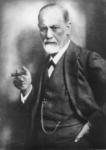 Freudianism
Freudianism
Yoga and Freudianism were not the best of friends; but, more recent research suggests that we are not trapped by the past. We keep developing and changing with time. Our current understanding supports the possibility of personal growth and development.
American Psychological Association
The American Psychological Association has published a review of some favourable studies of Yoga used in psychotherapy. So slowly divergent world views start coming closer together. Each informs the other. "The evidence is showing that Yoga really helps change people at every level," says Stanford University health psychologist and Yoga instructor Kelly McGonigal, PhD. I have quoted from their article on my web page.
Meditation 'eases heart disease'
Researchers say heart disease patients who practise meditation have reduced death rates
The American Heart Association said they had assigned 201 African Americans randomly to meditate or to change their lifestyle for a nine year study.The research was carried out by the Medical College in Wisconsin with the Maharishi University in Iowa. The results shoe the meditation group had a 47% reduction in deaths, heart attacks and strokes. The research was funded by $ 3.8 million grant from the National Institute of Health and the National Heart, Lung and Blood Institute.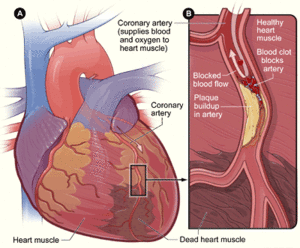
The benefits of Meditation
The average age of the men and women was 59 years and they all had a narrowing of the arteries in their hearts.
The group that practiced meditation did so twice a day for 20 minutes.The group that changed their lifestyle received classes in risk factors for heart disease, dietary modification and exercise. Besides the reductions in death, heart attacks and stroke in the meditators, they also had significant reduction blood pressure and psychological stress.
Apparently, this is the first controlled trial to show that long-term practice of meditation reduces the incidence of clinical cardiovascular events such as heart attacks, strokes and death. Dr. Schneider, lead author of the study, said that the effect of the trial was like adding a new class of drugs for the prevention of heart disease.
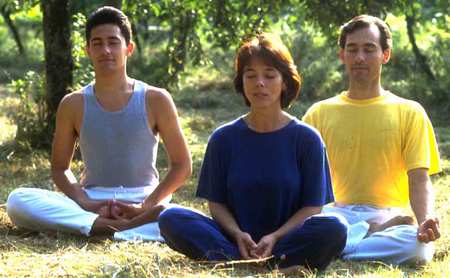
More Studies Needed
"However, in order to fully assess the differences …. meditation could have on heart patient's lives, we need to see research confirming it in a far bigger study and with other ethnic groups."
The Best Exercise for Healthy Bones
Healthy Bones?
A special section of Medicine & Science in Sports & Exercise, the journal of the American College of Sports Medicine detailed a continuing controversy in the field of sports science about exactly how exercise works on bone and why sometimes, it doesn’t. “There was a time, not so long ago,” when most researchers assumed “that any and all activity would be beneficial for bone health,” says Dr. Daniel W. Barry, an assistant professor of medicine at the University of Colorado, at Denver, who has studied the bones of athletes and the elderly.
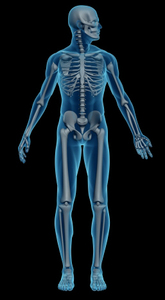 Recent Research
Recent Research
Recent findings are showing that competitive swimmers had lower-than-anticipated bone density, and that competitive cyclists sometimes had fragile bones and, finally, some studies suggest, that weight lifting did not necessarily strengthen bones much. Too much endurance exercise may actually reduce bone density. In a study by Dr. D.W. Barry, competitive cyclists lost bone density during a long training season. Dr. Barry says that it’s possible that exercise that is too prolonged or intense may lead to too much calcium loss through sweat. The endocrine system may interpret this loss of calcium as serious enough to start leaching the mineral from bone.
The Best Exercise
The current message about exercise and bone building may be that the best exercise is to simply jump up and down. "Jumping is great, if your bones are strong enough to begin with,” Dr. Barry says. “You probably don’t need to do a lot either.” (If you have a family history of osteoporosis, check with a doctor.) 
Hopping also aids in balance, which may be as important as bone strength in keeping fractures at bay. Dr. Barry says, “fragile bones don’t matter, from a clinical standpoint, if you don’t fall down.
Why Exercise Makes You Less Anxious
Exercise Creates new Brain Cells
Researchers at Princeton University recently made a remarkable discovery about how neurons respond differently to stress than to inactivity. Scientists have known for some time that exercise stimulates the creation of new brain cells (neurons) but not how, precisely, these neurons might be functionally different from other brain cells.
Exercise creates a Calm Brain
Preliminary results presented at the annual meeting of the Society for Neuroscience in Chicago, showed that experimental rats had created, through running, a brain that seemed biochemically, molecularly, calm when presented with stressful situations.

How Exercise Remodels the Brain
For years, it has been a given that exercise enhances mood. But how exercise might directly affect mood and anxiety — psychological states — was unclear. Now, thanks to improved research techniques scientists are beginning to tease out how exercise remodels the brain, making it more resistant to stress. At the University of Colorado, Boulder, scientists have examined the role of the neurotransmitter serotonin, considered to be the “happy” brain chemical. The view of serotonin has been undermined by this and other research. In those experiments, rats exposed to a laboratory stressor, showed increased serotonin activity in their brains. But those rats, that had run for several weeks before being stressed, showed less serotonin activity and were less anxious and helpless despite the stress.
Moderate Exercise reduces Effects of Oxidative Stress
Researchers have looked at how exercise alters the activity of the dopamine neurotransmitter in the brain, and on the antioxidant powers of moderate exercise. Anxiety in people has been linked with excessive oxidative stress, which can lead to cell death, including in the brain. Moderate exercise, appears to reduce the effects of oxidative stress. In an experiment at the University of Houston, rats whose oxidative-stress levels had been artificially increased were extremely anxious when faced with unfamiliar terrain during laboratory testing. But rats that had exercised, even if they had received the oxidizing chemical, were relatively calm under stress. When placed in unfamiliar circumstances, they didn’t run and hide, like the unexercised rats. They casually explored.
Positive Stress of Exercise
“It looks more and more like the positive stress of exercise prepares cells and structures and pathways within the brain so that they’re more equipped to handle stress in other forms,” says Michael Hopkins, affiliated with the Neurobiology of Learning and Memory Laboratory at Dartmouth, who has been studying how exercise differently affects thinking and emotion. “It’s pretty amazing, really, that you can get this translation from the realm of purely physical stresses to the realm of psychological stressors.”

Don’t Quit, Keep Exercising
The stress-reducing changes evoked by exercise on the brain don’t happen overnight. In the University of Colorado experiments, rats that ran for only three weeks did not show much reduction in stress anxiety, but those that ran for six weeks did. “Something happened between three and six weeks,” says Benjamin Greenwood, a researcher in the Department of Integrative Physiology at the University of Colorado. Dr. Greenwood added that it was “not clear how that translates” into exercise advice for humans. We do not know how intense the exercise needs to be. Dr. Greenwood says, the lesson is “don’t quit.” Keep running or cycling or swimming or doing Yoga. You may not feel a magical reduction of stress after your class, if you haven’t been exercising. But the molecular biochemical changes will begin, Dr. Greenwood says. And eventually, he says, they become “profound.”
See the New York Times
The Black Boxes of our minds
Even to Ourselves
The stories we tell about our mental processes are logically appealing but fatally flawed more often than not.
We all have our own theories about how our minds work. Unfortunately evidence based psychology demonstrates that our theories are often wrong. The differences between how we think our minds work and how they actually work can be quite startling, especially when we try to judge others. What we think are important factors in others often are not at all, while what we think is unimportant can make all the difference.
Social Psychology Study
In their classic study Nisbett and Bellows (1977) asked 128 women to judge if a person called Jill matched the requirements to work in a crisis centre. 'Jill', was a creation of the investigators, consisting of 3 pages of information: an interview transcript, answers to a questionnaire and a letter of recommendation.
The information presented to the women about Jill was the same except for 5 crucial factors which changed amongst the participants. The women were told that:
- Jill has an attractive appearance or nothing about her looks
- Jill's academic qualifcations are good or nothing about her studies
- Jill had had a car accident before or not
- Jill spilled coffee on the interviewer's desk or not
- Jill would meet the women subjects soon or not
This meant that each woman saw a different combination of items in Jill's profile.They were then asked to judge Jill on how much:
- sympathy she would have for others,
- the women would like her,
- flexibility she would have in problem solving,
- intelligence she had.
The women were then asked to rate how much each of the above factors influenced their rating on a scale of 1 to 7. The experimenters wanted to see whether the womens' judgements were controlled by factors they thought influenced them. In other words, do people know how their own minds work?
Poor judgement
The women turned out to be surprisingly poor at predicting the ratings of sympathy, likeability and flexibility and the effect of each on their own judgements. For example the women thought if Jill was good-looking she would be more sympathetic to others. But, it had the opposite effect; if Jill was described as good-looking the women thought others would find her less sympathetic.
They thought that the car accident would make Jill more likeable, but it made her less likeable. They thought the coffee-spilling would make her seem less flexible in problem solving; but those same women rated Jill as more flexible. And so on.
The interesting thing
All the women were wrong to the same degree. All the women probably used similar 'common sense' theories about how the mind works, which were mostly wrong. The results suggest that most of us have similar 'theories' about the way the mind works, from our culture or we worked it out from 'common sense'. The only area in which the women were accurate was intelligence. The women thought they could rely on the academic records to judge Jill's intelligence and, they could.
The weakness of introspection
This study shows how poor we are at understanding what will affect our judgement of another's personality, besides intelligence. People might know what they like, but they usually don't know why they like it. Similar results are repeated in other studies showing our lack of understanding of who we're attracted to, how we solve problems and where our ideas come from.
These results are a real challenge to psychologists like myself. The most important decisions in our lives, like choosing how we spend our time and with whom we spend it, are challenged. The stories we believe about ourselves are appealing, but are wrong more often than not.
The Age of Empathy:
Are We Essentially Good or Evil?
i thought that you would like to read what one of our most important primatologists has to say about empathy among animals and how he believes it is a behaviour that has evolved in mammals. He echoes his earlier hypothesis that we are good (altruistic) by nature and not just kindly mannered on the surface. Many believe, what Frans de Waal calls the 'veneer theory' of human behaviour, that we display an altruistic behaviour on the surface but that we are actually evil in our core. He is convinced that we are innately good. How encouraging to hear this from a biologist and zoologist.
 Kachiko
Kachiko
We took my daughter and her friend to see the recent film by Richard Geere called "Hachiko: a dog's story" based on a real dog that lived in Japan in the 1930s. The film helped us remember, as the Yoga and Buddhist traditions do, that we are part of the same family of creatures called mammals. Today, thanks to Darwin, we call this common heritage, evolution. Nevertheless, we all cried uncontrollably when the dog Kachiko, displayed devotion and attachment that compared to the most touching of human devotion. How can it be that he has such deep attachment to someone not of his speicies? Perhaps we are not so separated from other species as we have been led to believe by our Judeo-Christian tradition!
Animals also Display Empathy
Frans de Waal's latest book "The Age of Empathy" illustrates the mounting evidence for not only the six basic emotions as Darwin proposed but much more - empathy and sympathy; emotion and cognition. Not only do many animals feel empathy but they exhibit behaviours that suggest that they are capable of the cognition of empathy. De Waal 'shows us that many animals are predisposed to take care of one another, come to one another’s aid, and, in some cases, take life-saving action'. Here is an excerpt from his new book which was published in the September 2009 issue of Natural History magazine.
An Excerpt from "The Age of Empathy: Nature’s Lessons for a Kinder Society"
"Apes will groom and hug those in distress. There is also evidence of that behavior in dogs. Belgian biologists watched more than a thousand spontaneous fights among dogs released every day onto a meadow at a pet-food company. After aggressive outbursts, nearby dogs would approach one of the combatants—usually the loser—to lick or nuzzle, play with, or simply sit with him or her. Doing so seemed to settle the group, which quickly resumed its usual activities.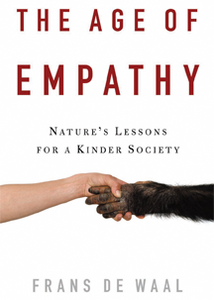 "
"
"As for its origins, empathy probably started with the birth of parental care. During 200 million years of mammalian evolution, females sensitive to their offspring out reproduced those that were cold and distant. When a pup, cub, calf, or human baby is cold, hungry, or in danger, its mother needs to react instantaneously. Females that failed to respond did not propagate their genes."
"Descended as we are from a long line of mothers who nursed, fed, cleaned, carried, comforted, and defended their young, we should not be surprised by gender differences in human empathy. Two-year-old girls who witness others in distress treat them with more concern than do boys of the same age. And in adulthood, women report stronger empathic reactions than men, which is one reason why a “tending instinct” has been attributed to women."
Frans de Waal
Frans de Waal is a psychology professor at Emory University with a Ph.D. in biology. He is the author of many books, including Chimpanzee Politics and Our Inner Ape. The director of the Living Links Center at the Yerkes National Primate Research Center in Atlanta, de Waal was ranked among the World’s 100 Most Influential People of 2007 by Time.
Should you eat meat?
“Eating Animals”
Jonathan Safran Foer’s new book “Eating Animals” (Little, Brown; $25.99) shows how, when our stomachs are involved “Food choices are determined by many factors, but reason (even consciousness) is not generally high on the list,”.
Are We Barbaric?
This year, Americans will cook roughly twenty-seven billion pounds of beef, sliced from some thirty-five million cows. They will consume about a hundred and fifteen million pigs, and nine billion birds. Most of these animals have been raised under conditions that are, as we know barbaric.
Vegetarianism
Foer’s position is that we eat meat because we like to, and we devise justifications afterward. “Almost always, when I told someone I was writing a book about ‘eating animals,’ they assumed, even without knowing anything about my views, that it was a case for vegetarianism,” he says. “It’s a telling assumption, one that implies not only that a thorough inquiry into animal agriculture would lead one away from eating meat, but that most people already know that to be the case.”
"Eating Animals" is a serious book that could change the way you live.
Can pronouns help your marriage?
We or I and You?
A recent study about the significance of using we vs. separateness pronouns, such as "I" and "You," among married couples has some interesting suggestions. The couples in the study were asked to have a conversation about their marital conflicts. Their emotional experiences during this quarrel were evaluated, and each partner was asked how happy they were in their marriages. The results showed that using we-ness pronouns was associated with higher levels of positive emotions, lower levels of negative emotions, and low levels of cardiovascular arousal. When one spouse used we-ness words, it was soothing to both. The results suggest that using "we" can be healthy and emotionally comforting. Older couples showed greater levels of we-ness usage and a greater sense of shared identity than the younger couples. Among older couples, the wives were more affected than their husband by the use of separate pronouns.
Use 'we' for more positive emotions
What would happen if families consciously used "we-ness" in conversations? Might this create more positive and relaxing moments, emotional closeness and compatibility?
Coffee drinkers develop less diabetes
Tea and Coffee
Tea and coffee drinkers have a lower risk of developing type 2 diabetes,according to new evidence. And the protection is may not form caffeine because decafinated coffee has the greatest effect. Researchers looked at 18 separate studies involving about 500,000 people. Results revealed that people who drink three or four cups of coffee or tea a day reduce their risk by 20%. Decaffeinated coffee reduces their risk by 33%.
Type 2 diabetes
Type 2 diabetes usually starts after the age of 40 and develops when the body does not produce enough insulin or the insulin does not work properly. The treatment usually includes a healthy diet, increased physical activity and medication. Each additional cup of coffee or tea consumed in a day cut diabetes risk by 7%. Instead of caffeine, other compounds in coffee and tea - like magnesium or lignans and chlorogenic acids - may be involved.
Lifestyle
"The identification of the active components of these beverages would open up new therapeutic pathways for the primary prevention of diabetes mellitus....If such beneficial effects were observed in interventional trials to be real, the implications for the millions of individuals who have diabetes mellitus, or who are at future risk of developing it, would be substantial." said Dr Victoria King, of Diabetes UK. "What we can be sure of is that the development of type 2 diabetes is strongly linked to lifestyle, which means that many cases could be prevented by keeping active and eating a healthy balanced diet that is low in fat, salt and sugar with plenty of fruit and vegetables."
We wish you a very happy Christmas
A Silent Halleluia for Christmas
We thought that you would enjoy this joyous Christmas Halleluia concert by a group of silent monks. Thanks to Tais Gill Tienda for showing us this video..

